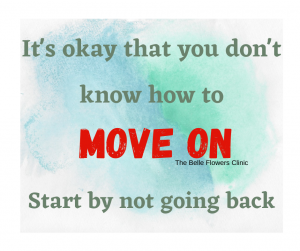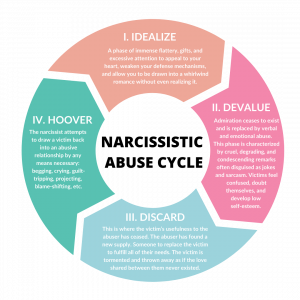Let’s talk about empaths and narcissists in an intimate relationship.
It is a recipe for destruction. It can lead to death…literally and figuratively. Every time we hear about a domestic violence case on the news, you can be sure that this escalated over time, and the person who was experiencing the violence would have been in a toxic relationship, with many red flags from the beginning. There would have been many moments when they realised they should have left, however something kept them stuck.
NEVER is it okay to blame the victim, however it is important to understand psychologically what is happening.

Trauma bonding is the term used to describe what happens when a person is involved in a cycle of abuse, devaluation and then positive reinforcement. In a relationship with a person with narcissistic traits, you will experience the cycle of love-bombing/idealisation; devaluation; discard; hoovering (where they try to suck you back in if you try to leave the relationship). The inability of a victim to leave or distance themselves from an abusive partner is part of the cycle of abuse with a person with narcissistic traits.

An empath is defined by the Oxford dictionary as a “science fiction” term and is “a person with the paranormal ability to perceive the mental or emotional state of another individual.” In the spiritual world, people froth their empathic nature, and believe it is part of their “duty” in life, to feel other people’s feelings deeply. They believe it so much like it is their “cross to bear”. (Read more in my blog “Am I an Empath” and learn how to heal this myth.)
An empath is someone who is naturally a care-giver, and very often someone who puts other’s needs before themselves. They might know they do this, or they may not. They may believe that this makes them a good person, and may fear being selfish if they choose to look after themselves first. An empath will often see the good in people, and forgive quickly the bad behaviour – even when they are the victim of bad behaviour. They will make allowances and excuses “he didn’t mean it”, “he does that when he is drunk, but never when he isn’t”, “she is just blowing off steam”. “she treats me well when no-one is around”.
Because you hold an inherent belief that people are good on the inside you refuse to see the other person for who they truly are – only their potential. And that is where you run into trouble. This inability to acknowledge bad behaviour, (or worse – you internalise it and make it about you needing to do more or be more), can be extremely self-destructive to an empath. When you are in a narcissistic relationship, or at least a toxic one, you will notice that the person’s words NEVER match their actions. Let this be your #1 RED FLAG.
(From a spiritual perspective all people are made from the source, however this doesn’t make them necessarily “good for you”.)

You may make the decision to leave, and start making plans, and even find support from friends and family or professionals. But you get pulled back in by the nice gestures, the grand gestures, the apologies, the promises to change. And things may be good for a while. A week or a month. But sure enough the behaviour goes back to how it always was – and oftentimes it gets worse. Much worse. Because now you know you should have left before, but you chickened out and couldn’t go through with it, because he/she/they “said they would change and it would be better”.
Sound familiar?
It never changes for long. It always reverts to how it was. And it hurts even more and the trauma bond increases. The periods of positive reinforcement become fewer and further between the abuse periods
Trauma bonding is a very powerful force that can make friends and family really frustrated with you, and make you frustrated with yourself. So let’s just acknowledge that for a moment. And it is OK if those around you are frustrated. (and if you are frustrated with yourself!)
So let’s use this energy and transmute it into action!
You know that you know that your know that this relationship is toxic.
And you also know that is is REALLY SCARY to contemplate change.
All good.
It IS scary.
But you know what is more scary? Seeing how deep the damage can go – to your physical body, you emotional body, your mental body and your spiritual body. (There are many people staying in relationships long past their due date who have chronic fatigue, fibromyalgia, mental health issues and contemplating suicide.)
STEPS TO TAKE:
So the starting place is to acknowledge what is.
The second step is to seek support from a professional who is experienced in working with people who are experiencing narcissistic abuse, and
And then naturally the third step is that you leave properly this time. For good. And you don’t go back for a second round or a third. (However this is REALLY difficult if you haven’t done any healing work on yourself before hand. I would even go so far as to say it is virtually impossible to leave without healing and counselling.)
Unless you have strong boundaries and have healed…(which can take a while) you will NOT be able to make a plan to leave and LEAVE FOR GOOD. So begin to heal BEFORE you leave and then you will feel strong and grounded for the road ahead.
Belle
Getting help from a professional who can help you identify the trauma bond, and identify the areas of trapped emotions you hold is the natural first step for anyone who is considering leaving a toxic relationship. The trauma bond is REAL, and the pattern keeps repeating itself over and over until you have healed enough that you can remove yourself.
Gift yourself this time and space so you can identify WHY you are in this relationship and HOW you can be released from the trauma bond.
Belle is an experienced counsellor and spiritual healer who will work with you to release your triggers and emotions that are trapped so you can feel stronger and more empowered.
Book your online or in-person session now

